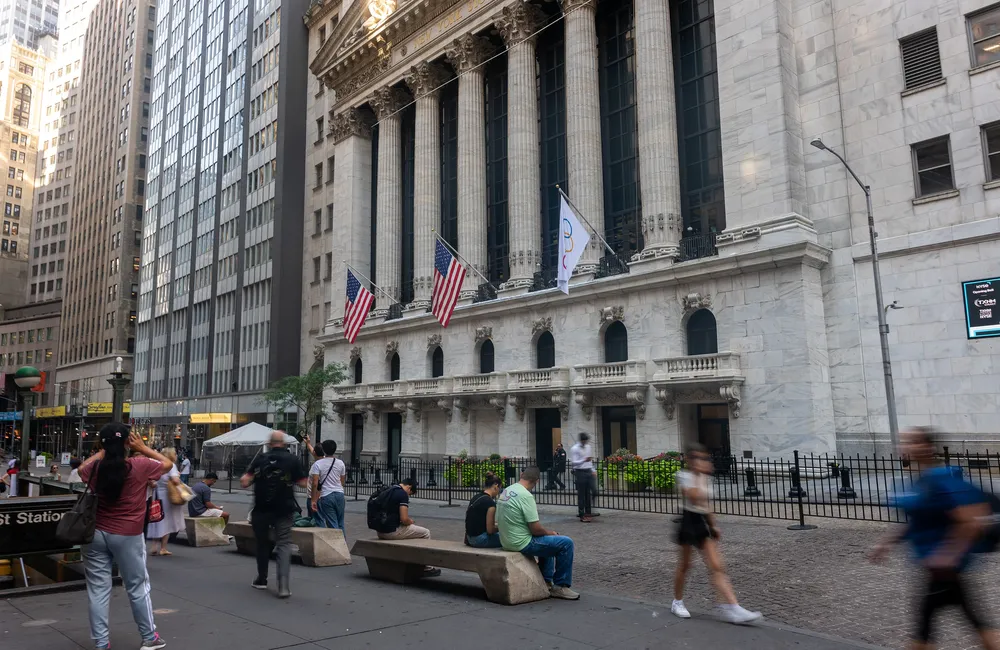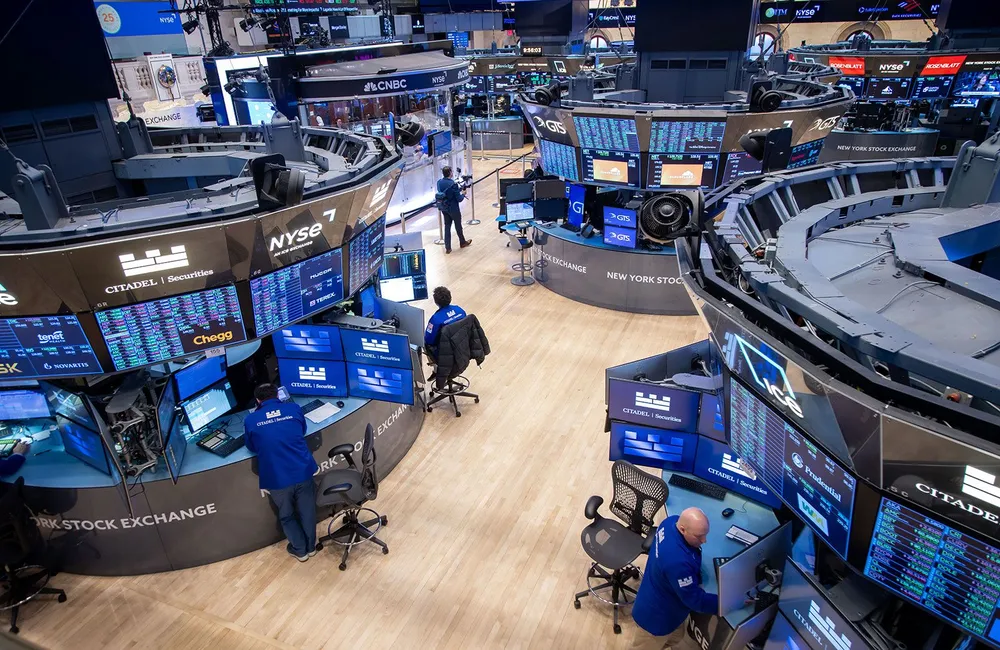ASX futures were hinting 20 points or 0.3% lower as of 8:00am on Thursday, indicating a dip at the open.
US stocks wavered after minutes from the Federal Reserve showed most officials favored slowing the pace of rate hikes at a policy meeting earlier this month.
The S&P 500 fell 0.2% and the Dow Jones Industrial Average lost 0.3%. The Nasdaq Composite index managed to gain 0.1% after falling in early trading.
Wednesday’s volatility reflects a recent shift in the stock market. After racing higher to kick off 2023, US stocks suffered their worst session of the year on Tuesday. Investors have parsed stronger-than-expected economic data, including readouts on inflation and retail sales, as well as business activity surveys.
In commodity markets, Brent crude oil slid 3.03% to $US80.53 a barrel while gold edged down 0.57% to US$1,824.66.
In local bond markets, the yield on Australian 2 Year government bonds edged higher to 3.56% while the 10 Year climbed to 3.87%. In the US, the yield on 2 Year Treasury notes gained to 4.70% while the yield on 10 Year Treasury notes jumped to 3.93%.
The Australian dollar declined to 67.98 US cents from its previous close of 68.53. The Wall Street Journal Dollar Index, which tracks the US dollar against 16 other currencies, edged up to 97.45.
Asia
Chinese stocks ended the session lower, retreating from a short-lived recovery on Tuesday as the market's range-bound trading persisted. The benchmark Shanghai Composite Index finished down 0.5% at 3291.15, while the Shenzhen Composite Index lost 0.3% to 2159.82. The tech-heavy ChiNext Price Index was the worst performer, falling 0.7% to 2451.90. Losses were concentrated in tech companies, as the sector pulled back from strong gains in recent sessions amid continued enthusiasm for emerging commercialization of artificial intelligence. Telecom provider Chine Telecom dropped 7.6% and video game developer Kaiser (China) Culture fell 6.2%.
Hong Kong's benchmark Hang Seng Index ended 0.5% lower at 20423.84, extending early losses. The market has turned more volatile in recent weeks following a rally at the start of the year fueled by China's reopening. Tech shares continued to weigh on the market after Tuesday's news that JD.com is planning to offer subsidies for stores operating on its platform, which could pressure margins. The Hang Seng Tech Index was 1.4% lower and JD.com dropped 3.0%. Techtronic Industries Co. was the biggest loser in the HSI with a 6.9% drop as Home Depot Inc., a major client, provided muted 2023 guidance which raised concerns over the power-tool supplier's growth outlook. The banking sector outperformed the market led by HSBC Holdings, which posted robust Q4 earnings Tuesday. HSBC was 5.3% higher and BOC Hong Kong rose 2.0%.
Japanese stocks ended broadly lower, dragged by sharp falls in electronics and auto shares, as concerns persisted over the Federal Reserve’s interest rate policy. Hitachi Ltd. dropped 3.4% and Nissan Motor lost 3.3%. Tokyo Gas slumped 6.4% on its plan to lower target ratio for dividends and share buybacks relative to net profit, partly to fund initiatives to reduce carbon emissions. The Nikkei Stock Average closed 1.3% lower at 27104.32.
India's Sensex index fell 1.5% to 59744.98, its lowest closing level since Feb. 1, tracking losses across regional equity markets amid ongoing concerns over interest rate tightening. The FOMC minutes due out later today will be closely watched, Swissquote Bank analyst Ipek Ozkardeskaya said in an email. Ozkardeskaya noted that the minutes are likely to be hawkish. Losses on the benchmark Sensex were broad-based, with Bajaj Finance slipping 2.9%, Mahindra & Mahindra dropping 2.45% and Bajaj Finserv losing 2.4%.
Europe
European stocks closed broadly lower on Wednesday as investors turned cautious before the release of the Federal Reserve's meeting minutes at 7:00pm GMT. The pan-European Stoxx Europe 600 dropped 0.3% and the French CAC 40 fell 0.1% while Germany’s DAX ended flat.
"Investors are clearly hoping that the Fed minutes will rescue them from this outbreak of bearishness over interest rates, but given the data we've had since then the minutes might not be able to do much to retrieve the situation," IG analyst Chris Beauchamp wrote. "European markets have fallen more than their US peers this afternoon, but are in a much better position overall, and seem to provide the better risk-reward outlook heading into March."
The United Kingdom’s FTSE 100 dropped 0.6% or 47 points as Lloyds Banking Group, miners and oil stocks fell. Lloyds shed 3% after what Citigroup described as a mixed 2023 outlook. Miners dominated the blue-chip fallers, with BHP and others weighing on the index after Rio Tinto reported lower underlying earnings for 2022. Rio shares declined 2%. BP and Shell lost ground as the price of oil retreated.
"Miners are trading towards the bottom of the basket after Rio's 2022 earnings disappointed," Interactive Investor head of investment Victoria Scholar wrote. "Lloyds is also under pressure after earnings, dragging other banks like HSBC down with it."
North America
US stocks wavered after minutes from the Federal Reserve showed most officials favored slowing the pace of rate hikes at a policy meeting earlier this month.
The S&P 500 fell 0.2% and the Dow Jones Industrial Average lost 0.3%. The Nasdaq Composite index managed to gain 0.1% after falling in early trading.
Wednesday’s volatility reflects a recent shift in the stock market. After racing higher to kick off 2023, US stocks suffered their worst session of the year on Tuesday. Investors have parsed stronger-than-expected economic data, including readouts on inflation and retail sales, as well as business activity surveys.
The new data has led investors to sharply reassess their outlooks for interest rates and led to a steep jump in the 10 Year Treasury yield, stoking volatility across markets.
"What's really occupying the market's mind now is this resilient growth, which is likely to mean more resilient inflation," said Grace Peters, an investment strategist at JPMorgan Private Bank.
Stock and bond markets had a muted reaction to the minutes from the Fed’s meeting three weeks ago, which showed that most Fed officials thought slowing the pace of interest rate increases offered the best way to balance the risks of doing too much or too little to combat inflation.
Markets are trading sideways as investors look for more signals from the Fed, said Luc Filip, head of investments at SYZ Private Banking. According to Mr. Filip, "If economic data continues to show strength, then the downward movement could resume" in stocks. Investors' changing outlook for interest rates has put a lot of pressure on markets, Filip explained.
Shares of Palo Alto Networks jumped 12% after the cybersecurity company swung to a profit last quarter and raised its guidance for the full fiscal year. CoStar declined 2.5% after it said it wouldn't buy a real estate business from News Corp, the parent of The Wall Street Journal, and issued a weaker-than-expected first-quarter forecast. Meanwhile, Coinbase shares lost 5.4% after the company reported earnings.





















